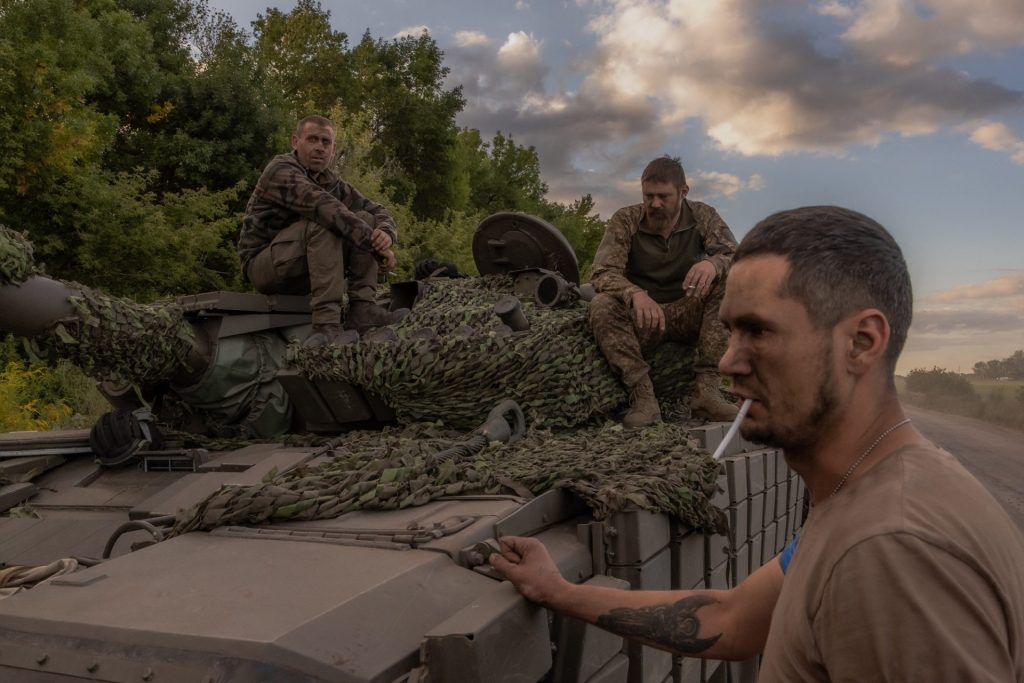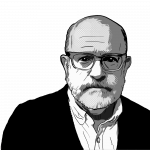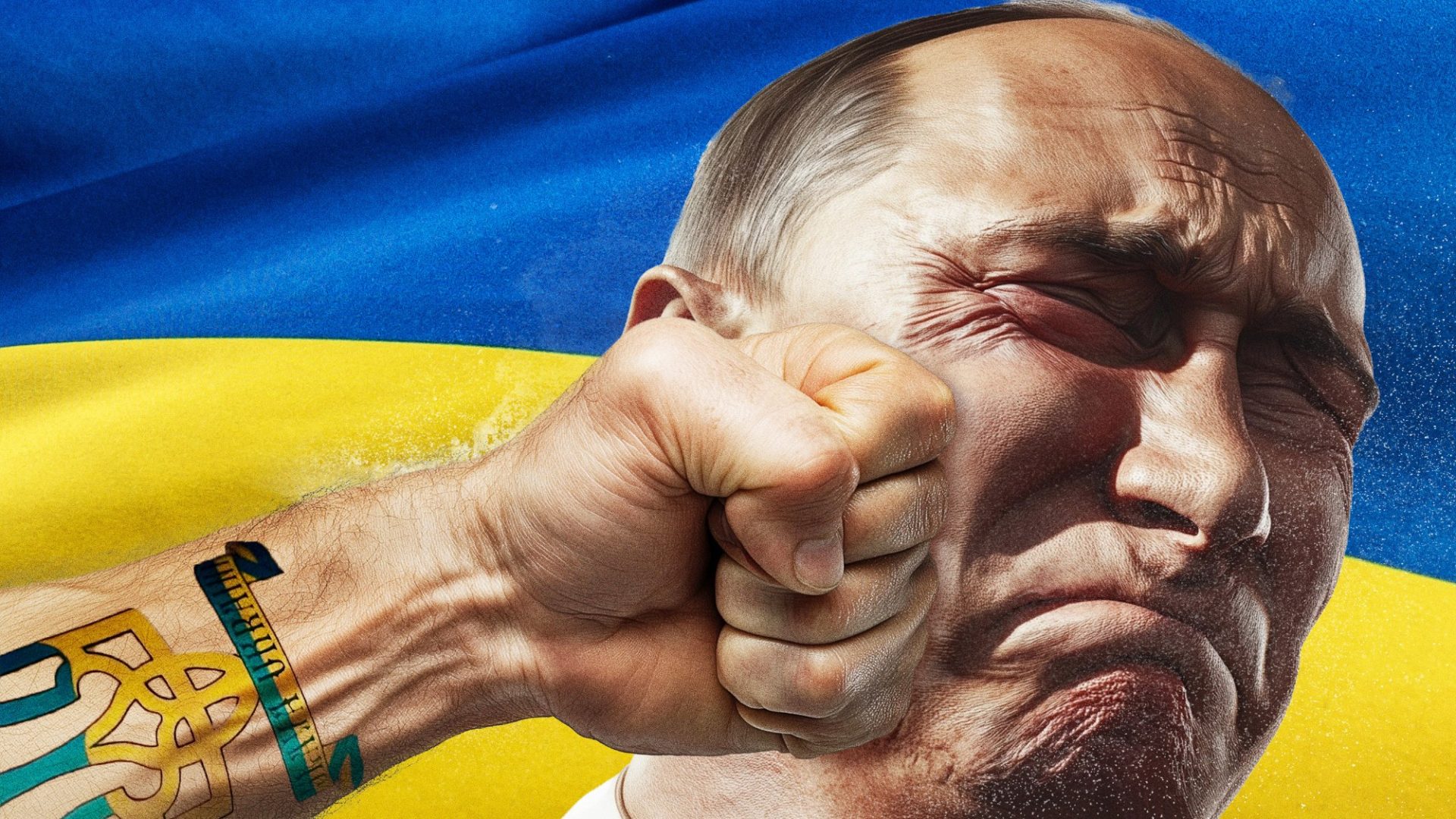Over a negroni, my friend in the Ukrainian special forces tells me that he has just been on holiday to Russia.
“What?”
“On holiday without a passport.”
It takes me a beat to work out what he is archly hinting at: he’s been part of Ukraine’s “special military invasion” into the Kursk oblast. In a stunning coup de théâtre, the Ukrainians have captured the gas metering plant of the last Russia-to-Europe pipeline and got within artillery fire distance of a Russian nuclear power plant. They have poked the Russian bear in the eye with a stick.
What was it like invading Russia? “It was cool,” he says, and his grey eyes glitter like those of a wolf. “The locals didn’t attack us. They weren’t a problem for us. When the Russian police disappeared, they started looting their own shops.”
Every Ukrainian knows that Russia is a nuclear power ruled by a vicious psychopath, and that they should be wary of doing what the Macbeths did: “We have scotch’d the snake, not kill’d it”.
In Odesa, a cool beach town, there’s a new stiffness in people when the air-raid sirens go off. Before Ukraine’s invasion, the in-crowd made a point of ignoring “Putin’s lullaby”. After Kursk, no one panics, but there’s a sense that Russia is angry and humiliated and that Vladimir Putin’s retaliation will be dark. That makes people move a little faster to wherever they are getting to.
My friend, the satirist Heydon Prowse, joined our gang, Mildly Dangerous Holidays Inc in Odesa, and mocked us as we all sipped cocktails in the Hotel Amsterdam watching the beautiful people float by. On his return to Odesa on the way out of Ukraine, he was enjoying a drink when the Russians hit the docks some half a mile away from where he was, shaking his ice cubes. Heydon texted me: “Mildly Dangerous Holidays got a little too dangerous. I’m giving you a shitty Trip Advisor review.”
Things have been bleak for Ukraine this past year and a bit, ever since the failure of last summer’s over-touted and over-leaked counter-offensive. The Russian way of war is to pound a frontline with artillery and then send their people into the meat grinder.
They have more metal and more flesh than the Ukrainians; worse, Putin is pitiless and does not care how many of his people die. The Ukrainians do.
A year ago, in one small town in the middle of the country, a pedestrianised street had a long line of black and white photos of dead soldiers. This year, the line has got much longer. Ukraine is slowly bleeding to death.
Everyone has lost someone, or knows someone who is injured or has had a close shave. Nastysya, a waitress at Zavertailo, my favourite cafe in the chic Podil area of Kyiv, went home to Kherson for a week. The Russian army sits 1,000 feet away, on the other side of the river, sending across drones that hunt civilians, looking for an easy kill.
Nastysya’s mum and dad are still there, in their flat overlooking the river. Her mum told her that one day she was drinking a coffee in her kitchen when she saw a Russian drone enter an open window in another block of flats nearby and detonate. No one in Ukraine is safe.
But the joy of giving the Russians a taste of their own medicine is unconfined. Outside the Buena Vista, the Cuban-themed salsa bar that stayed open during the battle of Kyiv despite martial law banning the sale of alcohol, two pals marvel about how some of the locals in Kursk have been videoed talking in Ukrainian.
“We want the Russians to respect the borders of 91. Not 1991, when the Soviet Union broke up and Ukraine said goodbye to Russia, but 1691, when Ukraine had Kursk.” We then start arguing about where Ukraine stops and Russia starts. As I head off to bed, I find myself delivering the parting shot: “Just don’t invade Alaska.” My friends cackle like geese.
Since the start of the Big War in February 2022, Ukraine has been fighting Russia with one hand tied behind its back. Joe Biden’s West Wing is worried that Ukrainian victory will lead to Russia falling apart, to chaos, with maybe a rogue Chechen leader getting hold of a nuclear bomb and/or China gobbling up Siberia.
The nightmare that haunts the power-brokers in DC is Russia becoming Iraq 2.0, while Trump is on the warpath. (NB Trump’s polling numbers in 2016 this far out from November 4 were far further behind Hillary Clinton than they are behind Kamala Harris. He could still win)
America’s neurotic fear of Russian chaos is a gift to the killer in the Kremlin. Because of it, the United States has drip-fed arms to Ukraine, always giving them enough to stay in the fight but nothing like enough to win.
“It’s like gladiators,” says Max, the owner of the Buena Vista. “We are fighting and dying for their sport.”
Kursk is the mutiny of the gladiators. The Ukrainians didn’t tell the west what they were going to do. They waited for the brown-out in American power when Joe Biden fell on his sword and while Harris was busy harvesting votes. Then they struck.
They knocked out the high-altitude Russian drones, leaving them blind in the sky. They jammed the frequencies of the low-level Russian drones that spy on the Ukrainian trenches, leaving the enemy deaf.

My friend with the negroni had spent the late spring “on holiday” mapping Russian minefields so that the Ukrainians knew exactly where not to go. They moved fast, using Humvees and German Marder and US Stryker armoured cars, bringing their FPV (First Person View) drone operators and jammers with them, keeping the Russians deaf and blind, punching forward, on repeat.
The Russian commanders fled; the Russian conscripts surrendered; the Russian civilians did nothing to slow down the Ukrainian advance. Twice now Russia has been invaded from Ukraine; first last summer, by the Wagner Army led by the late Yevgeny Prigozhin.
When his troops entered Rostov-on-Don, no Russian civilians got in their way. Likewise with Kursk this summer.
The two invasions are kind of opinion polls, and the results for the little man in the Kremlin do not look good. It is as if, if you unplug the brainwashing, no ordinary Russian gives a tuppenny damn for Putin and his regime.
As ever under serious threat, Putin disappeared for 24 hours, only to pop up on state visits to Azerbaijan and then Chechnya. I believe that Putin has at least one double whom he takes with him on these trips. The real Putin does the heavy lifting with his opposite numbers, but the double goes out and presses the flesh in closely curated videos.
The double is shorter, his face puffier, his suits obviously less expensive than the real thing. The critical tell is that real Putin is a coward, afraid of getting Covid from randoms and exposing himself to the assassin’s bullet; the double meets and greets all-comers.
Why the trips? There’s been some reporting in the Financial Times that the Chinese have cut back the money they are paying for Russian gas and oil. My hypothesis is that Chairman Xi is getting fed up with the war and Putin’s failure to bring the Ukrainians to heel, or to the negotiating table. Kursk will have only underscored China’s irritation.
The trip to Chechnya was a play for his domestic audience, showing that relations between the Kremlin and its psychotic quisling, Ramzan Kadyrov, are as strong as ever. The truth is that Chechen troops stationed on the Kursk border were the first to flee, and Russia fears another explosion in its unruly south. Rumours about Kadyrov being seriously unwell seem far-fetched.
But there is no gloss on earth that can hide the simple fact that David has invaded Goliath’s empire and is, for now, staying put. The Ukrainians have secured their gains by blowing up three bridges, making it very hard for the Russians to resupply their troops with ammunition, food and clean water, while the Ukrainian logistics are so much easier. The Ukrainians now control the massive gas-metering station at Sudja. If the Russians try to get it back, it could get hit accidentally – or “accidentally”.
Russia has long played nuclear blackmail because it managed to grab the Zaporizhzhia nuclear power plant, Europe’s biggest, in the south of Ukraine, in the early days of the Big War. But now Ukrainian artillery is within firing range of the Kursk nuclear plant.
The Ukrainians are smart enough not to hit it, but they could knock out the power connectors feeding electricity to the region. Their very proximity to Kursk weakens Russia’s hold over Zaporizhzhia. It’s a Mexican stand-off, with added vodka.
Meanwhile, the Russian meat grinder gnaws away at Ukraine’s lifeblood in Donetsk. So the two ways of war are continuing on their own paths: the Ukrainians have shown their mastery of combined arms manoeuvre in Kursk; the Russians are sticking with shredding flesh with metal in Donetsk.
Rather to Ukraine’s surprise and dismay, the Russians have not pulled many troops out of Ukraine to fight in Kursk. The messaging from the Kremlin lie factory is that the invasion is the “new normal” and it will take time to evict the Ukrainians.
The mood in Kyiv is one of exhausted defiance. The golden days of the first months of the Big War, when Ukraine was fighting for its very life, are long gone.
Corruption is back, with a vengeance. The family of the head of the draft in Odesa has a €3m villa in Spain. The minister of agriculture has been arrested on corruption charges. Ukraine seems intent on selling off its black earth to big agri-oligarchs, not small farmers. One could go on and on and on.
Volodymyr Zelensky is a hero on the international stage, but domestic policy is run by his chief of staff, the widely disliked Andriy Yermak. “Zelensky likes talking to Congress and the Houses of Parliament; he doesn’t like killing the cockroaches in his kitchen,” is how one Ukrainian friend put it.
Corruption has a direct bearing on the conduct of the war. Everyone knows that rich kids pay bent doctors around $5,000 for a medical note saying they are not fit to fight. The poor kids can’t do that.
The big picture remains that a vastly richer, more populated and far bigger fascist dictatorship has just been invaded by its smaller democratic neighbour. Military victory is out of reach for both sides. The question is which country will fall apart first.
I am putting my money on Russia cracking up. If I was Vladimir Putin, I’d start checking my life insurance policy.
John Sweeney’s latest book is Murder in the Gulag: The Life and Death of Alexei Navalny, published by Headline




